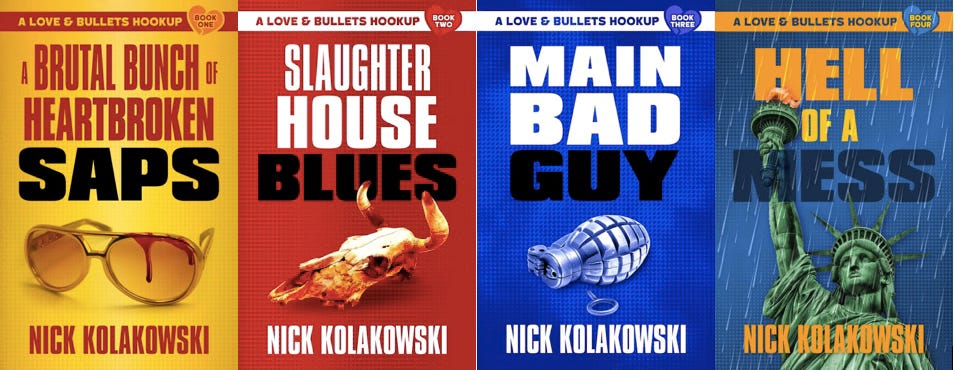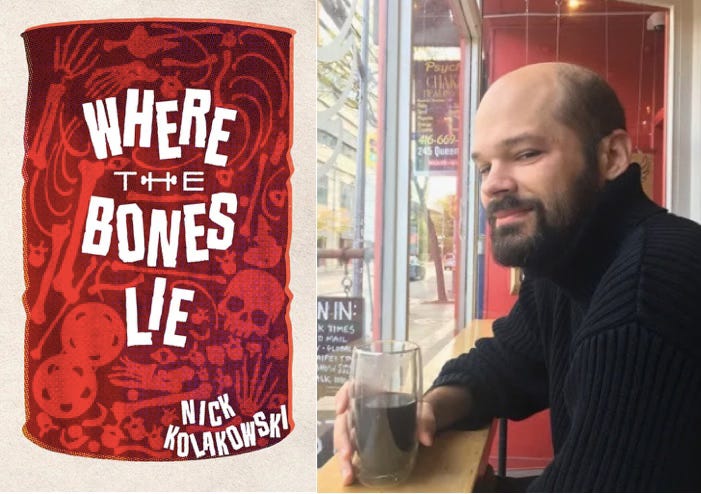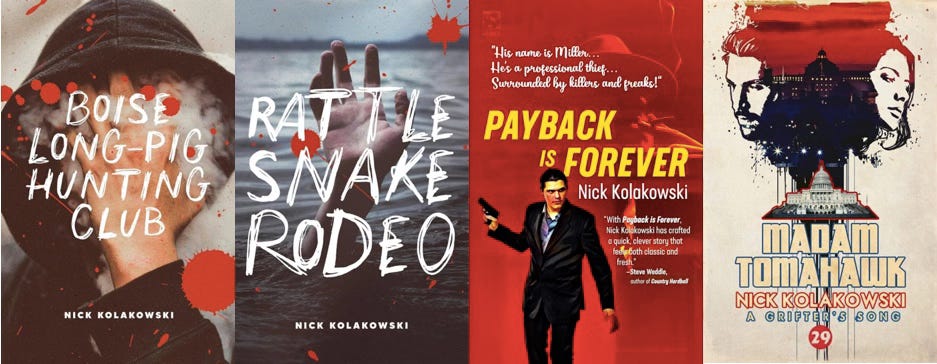Nick Kolakowski is an award-nominated crime writer living in New York City. His impressive body of work mixes novels, novellas, and short stories. He also hops between genres, frequently dipping his pen into horror. His fiction has appeared in Mystery Weekly, Shotgun Honey, and Rock and a Hard Place, among others. The best place to find his books is here: nickkolakowski.com.
I’ve read a lot of Nick’s work, and his stories always give me a tickle. His latest, fresh off the presses, Where the Bones Lie, is a detective story. As the blurb says: “A fast-paced, darkly funny thriller with a twist you won’t see coming.” I read it, I can confirm!
But to start this conversation and because that’s how I discovered Nick, we’ll talk about his characters in the Love & Bullets series, Bill and Fiona.
M.E. Proctor: A Brutal Bunch of Heartbroken Saps was the first novel of yours I read, and I immediately got a crush on Bill. When we meet him he’s in a dreadful situation—hanging upside down over a pit, tied up with chains. And he’s cracking jokes. The guy is a conman, he also has style, and what I would call a sunny disposition (despite the dire circumstances). How was Bill born?
Nick Kolakowski: I spent a few years as a journalist covering the luxury business. You run into a lot of hustlers in that line of work, the kind of people who’re wearing a ten-thousand-dollar suit and driving an ultra-luxury sedan, but they only have ten bucks to their name, if they’re not thousands of dollars in debt. The kind of people who’ll jabber smoothly at you for hours about their latest venture, and maybe it’ll all work out for them in the end, but chances are just as good they’ll end up sleeping in a roach-riddled studio in Queens by Christmas.
Bill is an aggregation of a few of those guys. I wanted to craft a character who isn’t particularly good at fighting or driving or any of those other things we expect from our noir heroes, but he’s excellent at figuring out how to separate people from their money via overly complicated cons. That means he needs to rely intensely on his girlfriend, Fiona, who’s very good at killing people and surviving chaos. I hoped the yin and yang of those characters, their respective weaknesses and strengths, would serve as the book’s main engine.

Bill is sort of the prototype for how I develop fictional characters. I really like writing about people who are ill-suited for their environment, even if they’re particularly good at one thing or another. Dash, the main character of Where the Bones Lie, is the complete opposite of a competent detective when he starts out; Frankie, the gun-running lady at the center of my Boise Long-Pig books, completely fails at displaying the empathy and tact that would've helped prevent her life from going completely to hell. While it’s fun to read about folks like Jack Reacher who can effortlessly solve crimes or smash a dozen bad dudes to paste, sometimes it’s more fun and suspenseful to have characters who bumble through, trying to figure things out, and almost getting killed in the process.
M.E.: Humor, or dark sarcasm are a constant in your books. Bill has snappy lines (and Fiona rolls her eyes), Jake and Frankie in Boise Long-Pig Hunting Club have less time for comedy because they’re running all the time, but the story itself—the most dangerous game—has gleeful vibes appropriate for a variation on a gothic horror classic, and in Where the Bones Lie you go one step further by making Dash a stand-up comic, a terrible one. A lot of crime fiction has been rather hard/grim/unflinching lately. Do you think the time has come for some ‘lightening of the mood’? I’m thinking of Rob Hart’s recent Assassins Anonymous that also tells a solid story with a wink.
N.K.: I like to compare it to music: you’d be bored if a song consisted of the same two notes hit over and over again. In a similar fashion, when it comes to crime fiction, you can’t just push the ‘grimdark’ button repeatedly and expect that your audience will stick with you—you need to shift things up. You’re also a fan of inserting humor into your writing, so you know where I’m coming from on this!
As much as I love indie publishing, I think that balance is something books out of the Big Four and their imprints do much better than the indie scene. Editors at the mega-imprints know their first and foremost job is to entertain, to provide something of value when someone plunks down twenty bucks for a book, and they know how to shape a narrative so it delivers the full range of what the audience wants—suspense, humor, maybe even good wordsmithing. On the indie scene, there are way too many writers who think they’re delivering unvarnished truths to their audience for the very first time, and their prose risks descending into a pedantic drone as a result.
So yeah, humor is a vital tool in the writer’s tool chest. People should aspire to make their writing funnier, especially if they’re tackling dark subjects.
M.E.: About your latest, Where the Bones Lie. For the first time, your main protagonist is a private detective. Dash Fuller used to be a Hollywood fixer, but he got burned and developed a profound disgust for the trade. He’s running out of money and he needs a job. Then a girl walks in. Madeline wants to know who killed her father, a pretty shady dude. And there we go … It is a PI novel, but Dash is a bit out of his league, and Madeline is a handful. Tell us about the book, why a detective novel, and about the relationship between Dash and Madeline.
N.K.: I’d always wanted to write a detective novel. As I like to tell people, my love of crime fiction began when my Dad gave me a copy of Chandler’s Trouble Is My Business when I was ten. But I always found the prospect of writing one to be extremely intimidating. Mostly, that was because I wasn’t sure I could find a unique angle—in the 184 years since Poe’s Murders in the Rue Morgue, we’ve had what feels like an infinite number of authors writing an infinite number of detective stories featuring an infinite number of plots.
The more I thought about it, though, the more I felt there was some room to work if I focused on a detective who was just learning the basics of the trade. I love Casino Royale and Batman Begins more than other movies because you see Bond and Batman figuring things out, screwing up royally, and displaying moments of intense vulnerability. I’ve always enjoyed Rob Hart’s Ash McKenna detective novels for similar reasons; over the course of five books, you see Ash evolve from a brawler and a bit of a bumbler to a pretty sophisticated sleuth. So ‘newbie detective’ isn’t a ground-breaking concept, but I felt I could riff on it in interesting ways.
Once I settled on that framework and the plot, I focused on the relationship between Dash and Madeline. I proceeded from the simple idea that they’re both broken people, but their strengths complement each other in ways that might help them heal—if they can survive, that is. Like many of the pairs in my books, I wanted a yin and yang: Madeline is impulsive (as demonstrated by her daredevil driving, her smoking, her freakouts) but intuitive, whereas Dash is more clinical but also more hesitant.
One other thing: I’m hoping that, if everything goes well, this becomes a series. And if that happens, Dash and Madeline will always stay platonic. Everyone remembers how “The X-Files” went to crap when Mulder and Scully finally got together.
M.E.: Talking about series … I love them as a reader, but I was a bit surprised to love them even more as a writer. Some characters I come up with seem to be screaming for more. What’s your vision of a series—you have done several. What, for you, makes a character ‘series-ready’ and are there signs that ‘this is enough, it’s time to move on’?
N.K.: That’s a tough question to answer. The facile response is, “You stop writing the series when there’s nothing more to say about a character, when they stop evolving completely.” Except some series feature a main character who doesn’t really evolve in their personality and methods, and the whole point is their immersion in new adventures; I’m thinking specifically of Jack Reacher, Hercule Poirot, and so on. Those kinds of series depend on a comforting familiarity: you know exactly what you’re going to get. With the right scenarios, you can spool out twenty, thirty books if you live long enough, and then your descendants can write spinoffs until the Earth plunges into the sun.
Then you have a character like Bernie Gunther, who evolves over the course of the Berlin Noir books into a disillusioned figure mirroring the worn-out, blasted landscape around him. Philip Kerr could easily have ended that series in pre-War Germany, but kept playing out the string until Gunther reflects a swath of mid-century European history. If you feel a character has room to evolve, there’s no reason to stop.
For me, knowing whether a character is ‘series ready’ is a gut call. With Dash and Madeline, I have two future books plotted that follow their continuing growth as people, while throwing them into interesting situations that I think are timely given everything going on in the country. Whether it continues beyond that—I guess that depends on how well the books sell!
M.E.: Are you taking a break after Bones or do you have something else cooking?
N.K.: I’m already writing the sequel to Where the Bones Lie, but it’ll likely be quite a bit of time before that’s finished. I also have a few short stories in queue, and I’ve been batting ideas around with a Hollywood producer about a horror screenplay. I’m like a ferret on crystal meth, to steal a line from one of my favorite gonzo crime films*—I just can’t stop moving.
M.E.: Thank you so much, Nick. This was a pleasure. Let’s talk again soon!
*(Some of you hate clicking on links, so that’s from Tony Scott’s Domino, 2005)






Thanks for this post, Martine. Nick's description of the dynamic and complimentary personalities of his two protagonists was perfect for inspiring my own writings about crime-solving pairs. Best of luck, Nick, with WHERE THE BONES LIE--a book I too hope inspires a series ( ;
I need to start reading Nick's books. I've had Payback is Forever in my library for quite a while now, and it's high on my list.